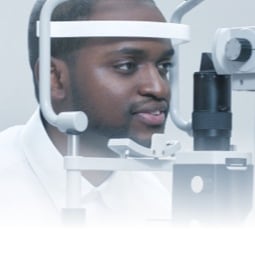Diabetes & Your Vision
Diabetes is a disease affecting how the body produces or uses insulin. Insulin controls sugar (glucose) levels in the bloodstream. The high blood sugar levels caused by diabetes can lead to multiple health complications, including vision loss. It’s a leading cause of blindness in American adults.
Diabetic eye exams can prevent 95% of vision loss caused by diabetes. With regular eye exams, your eye doctor can detect changes to eye health, diagnosing eye problems before you’re at risk for permanent damage. Prevention and early treatment can save your sight.
Contact us to learn more about diabetes and your eyes.
Diabetic Eye Disease
Diabetes affects how your body processes sugar. When uncontrolled diabetes causes high blood sugar, people can develop various health problems, from heart disease to diabetic eye disease.
Diabetic eye disease is a general term for the eye-related symptoms of diabetes. The term often includes diabetic retinopathy, diabetic macular edema, glaucoma, and cataracts.
Diabetic Retinopathy
Diabetic retinopathy is a complication of diabetes causing progressive retina damage. High blood sugar levels affect blood vessels, leading to fluid leaking and tissue swelling. Diabetic retinopathy usually affects sight in both eyes.
Later stages of the disease, known as proliferative diabetic retinopathy (PDR), can develop multiple complications due to abnormal blood vessel growth and decreased oxygen. PDR can lead to severe vision loss, retinal detachment, and glaucoma.
Diabetic Macular Edema
Diabetic macular edema (DME) occurs when excess fluid in the eye affects macula function. The macula is the central part of the retina and is responsible for detecting color and detailed vision. Over time, increased blood sugar weakens blood vessels in the retina and surrounding tissue. Leaking blood vessels cause the macula to swell and thicken, decreasing vision.
Glaucoma
Glaucoma is a term for a group of eye conditions that cause progressive optic nerve damage. High blood sugar levels contribute to abnormal blood vessel development, blocking the eye’s drainage system. As a result, fluid builds in the eye, increasing eye pressure and damaging the optic nerve.
Vision loss worsens over time, typically beginning with decreased peripheral vision and leading to blindness. Diabetes nearly doubles your risk of developing open-angle glaucoma.
Cataracts
A cataract is a cloudy spot that appears on the normally clear lens. Cataracts usually develop due to aging but can occur because of injury or high blood sugar levels. How much vision is affected depends on the cataract size and density, but it can cause blurry vision and decrease color vision.
In the early stages of development, glasses or contact lenses may improve vision. In later stages, some patients can benefit from cataract surgery, replacing the natural lens with an artificial or intraocular lens (IOL) implant.


Preventing Vision Loss with Detection & Treatment
Diabetic eye exams are similar and yet different in comparison to comprehensive eye exams. Both assess eye health, but diabetic eye exams place extra focus on the retina and blood vessels. Your eye doctor will perform a dilated eye exam and provide personalized advice about protecting your sight.
Treatment for diabetic eye disease depends on the symptoms and stage of development. Your optometrist may recommend medications or surgery, such as anti-VEGF injections or laser treatment (photocoagulation), to control abnormal blood vessel growth.
Part of early detection is watching for symptoms, including:
- Blurry of wavy vision
- Dark areas or vision loss
- Flashes of light
- Frequent vision changes
- Increased floaters & spots
- Poor color vision
If you experience any symptoms, contact us as soon as possible. At Santa Cruz Optometric Center, we’re dedicated to helping our patients maintain healthy vision.
Come See What We’re About

Visit us
Visit our team at Santa Cruz Optometric Center at our downtown location!
- 904 Cedar St
- Santa Cruz, CA 95060
Hours of Operation
- Monday: 9:00 AM – 5:00 PM
- Tuesday: 9:00 AM – 5:00 PM
- Wednesday: 9:00 AM – 5:00 PM
- Thursday: 9:00 AM – 5:00 PM
- Friday: 9:00 AM – 5:00 PM
- Saturday: Closed
- Sunday: Closed


Our Brands











